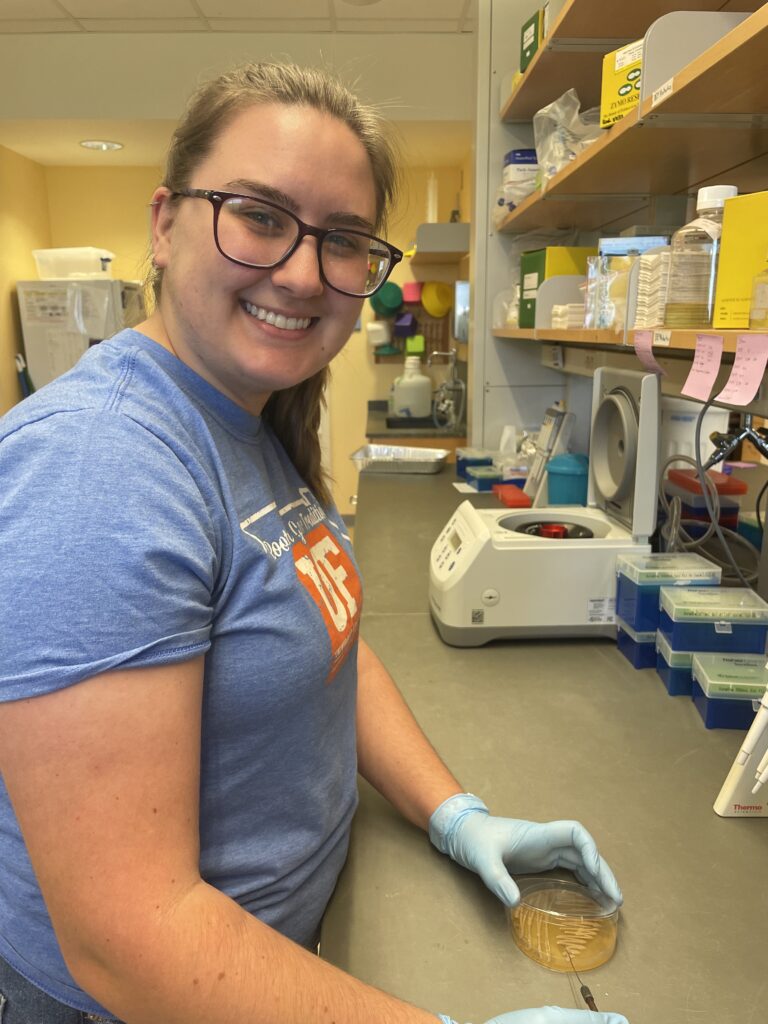Kalie Januszkiewicz was a 2022 Florida Sea Grant Intern and now serves as a Laboratory Technician in the Soil, Water, and Ecosystem Sciences Department at the University of Florida.

Kalie Januszkiewicz in Dr. Julie Meyer’s lab at UF, developing probiotic treatments for stony coral tissue loss disease.
I grew up in northeast Florida just 20 minutes from the beach, so I’ve always had an interest in marine science and the ocean. However, ever since I was gifted a children’s microscope when I was young, I’ve been fascinated by the microscopic world. I eventually went on to earn my B.S. in microbiology from the University of Florida in 2022. While I was in college, I learned that there are scientists that study microbes that live in the ocean. I was ecstatic – I didn’t realize that I could combine these two interests! When Dr. Julie Meyer advertised in her class that she had a summer internship position open to help with her work on the coral microbiome, I jumped at the opportunity.
As a Florida Sea Grant intern in Summer 2022, I worked in Dr. Julie Meyer’s lab at UF specializing in marine microbial ecology. My internship focused on developing probiotic treatments for stony coral tissue loss disease (SCTLD), or in other words, using beneficial bacteria to help treat and potentially even prevent the disease.
SCTLD is a big problem that deserves more attention because it’s one of the factors that has contributed to the significant decline of Florida’s coral reef. It causes rapid tissue death in corals and can kill entire coral colonies.
SCTLD was first discovered around Virginia Key in Miami-Dade County in 2014 and has since spread to 26 countries in the Caribbean and affects 34 coral species. The pathogen hasn’t been identified yet, but antibiotics have been effective, so it’s suspected to be a bacteria. The changing climate may also be making corals more susceptible to diseases like SCTLD by causing changes to their microbiomes – the diverse microorganisms that reside on or within their host and are critical for host survival. This makes it easier for potential pathogens to invade and make the corals sick or kill them.
Coral reefs are invaluable to Florida and our livelihoods.
Kalie Januszkiewicz
Coral reefs are invaluable to Florida and our livelihoods. For example, coral reefs supply millions of dollars in tourism. They’re also important to Florida’s fishing industry because many of the fish we eat live on the reefs for at least part of their life cycle. Furthermore, coral reefs provide some protection to the coast against hurricanes, which can help lessen storm damage and flooding.
Corals also supply lots of services for the ocean, the planet and people globally. The loss of these corals removes a vital source of food and shelter for various marine life, such as sea urchins, crabs, fish, sea turtles and sharks. Coral reefs also affect the water quality of the ocean and the state of the planet. Stony corals get their name because they use carbon from the water to build a skeleton. The more carbon they take from the ocean, the more carbon the ocean can absorb from the atmosphere, which helps to mitigate the effects of climate change. Corals help to keep the ocean clear and blue, instead of murky and green-tinged with overgrown algae. Threats like SCTLD put these ecosystems and all the benefits that coral reefs provide in peril.
For my internship, I helped with part of the process of identifying and developing probiotics, which may protect corals from disease. I learned how to take care of the corals we have in the lab, how to do DNA extractions and 16S PCR. I helped culture some potential new probiotic bacterial strains. We’re trying to identify new probiotics even though antibiotics work because we’re worried about the development of antibiotic resistance. If we can figure out what bacteria are present in healthy corals, we can grow them in the lab and use them to treat diseased corals so that the beneficial bacteria can outcompete the pathogen.
I graduated from UF last Spring, and after the internship ended, Dr. Meyer hired me on as a laboratory technician. Thanks to my FSG internship, I found my passion and learned new skills that are helping me to continue my career. I’m even getting Scuba and science diver certified soon so that I can help graduate students in Dr. Meyer’s lab collect samples from the field for their projects! I’m looking forward to continuing to work with the amazing people that I met through my FSG internship.